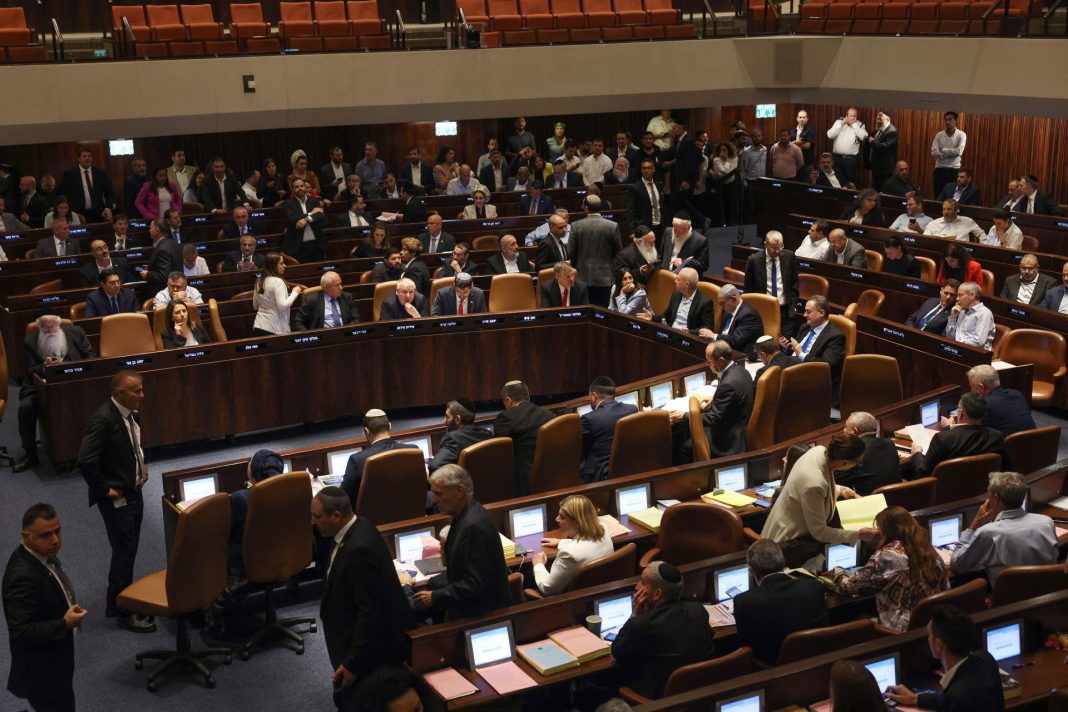Israeli lawmakers have passed a key bill in the government’s controversial judicial reforms, as police use water cannons on protesters blocking roads leading to the parliament building.
Members of parliament passed the “reasonableness” bill by 64 votes to zero, after opposition lawmakers left the parliament in protest.
The bill would see the abolition of the “reasonableness standard”, eliminating the Supreme Court’s ability to block government decisions it deems unreasonable.
It’s part of a package of bills proposed by the government earlier this year, which is seeking to overhaul the judicial system in the country.
Demonstrators of the plan say it is necessary to restore the balance of power between government branches, while opponents say it will remove checks and balances and undermine the independence of the judicial system.
There were disagreements within the far-right coalition government’s ranks leading up to the vote, with Defence Minister Yoav Gallant reportedly calling for last minute compromise talks with the opposition.
However Justice Minister Yariv Levin and National Security Minister Itamar Ben-Gvir refused the proposal, according to Haaretz.
“We have taken the first step in a historic process to correct the judicial system,” Levin said following the vote.
Finance Minister Bezalel Smotrich stated that the government “left no stone unturned until the last minute but the opposition unfortunately opposed”.
Meanwhile, opposition leader Yair Lapid accused the coalition of abusing its power, and said he would petition Israel’s high court against the new law.
“This is a complete breaking of the rules of the game,” Lapid continued, noting, “The government and coalition can choose what direction the state goes in, but it can’t decide the character of the state.”
“This is a sad day, a day of our home’s destruction, of needless hatred, and look at the coalition celebrating,” he added.
Demonstrators wielding Israeli flags shut off streets near the Knesset building earlier on Monday, with some chaining themselves to one other.
Footage shared on social media showed firefighters using electric handsaws to break up the human chain of demonstrators, while security officers were seen forcefully removing others.
Two protesters were hospitalised after water cannons struck them in the head and neck, Haaretz reported.
At least 19 people were arrested in the Jerusalem protest, police confirmed.
On Sunday, US President Joe Biden called on Israel not to rush the “divisive” reforms.
“It looks like the current judicial reform proposal is becoming more divisive, not less,” Biden told Axios on Sunday.
“Given the range of threats and challenges confronting Israel right now, it doesn’t make sense for Israeli leaders to rush this – the focus should be on pulling people together and finding consensus,” he added.
There was a sharp decline in the stock market and the shekel weakened compared to dollar following comments by Lapid suggesting all attempts at compromise with the government had failed.
“In recent weeks, and especially in the past 48 hours, we did everything possible to reach agreements, as promised,” Lapid told reporters at the Knesset, adding, “Our main condition was to protect Israeli democracy, but with this government it is impossible to reach agreements that preserve Israeli democracy.”
Scores of petrol stations and shopping centres, among other businesses, were shut on Monday after the Israeli Business Forum decided to suspend business activity over the judicial reforms.
The forum represents some of the country’s biggest corporations and banks.
“We call on the prime minister to fulfill his duty and to understand the magnitude of the disaster that may occur,” it said.
Poll results reported by national broadcaster Kan found that 46 percent of Israelis opposed the amendment, while 35 percent were in favour and 19 percent undecided.
Tens of thousands of Israeli protesters set off on a march to Jerusalem from Tel Aviv last week, reaching the Knesset building ahead of the vote.
Demonstrations and strikes have taken place regularly since January in a bid to force the government to halt its judicial plan.
Protesters were given a boost recently after hundreds of reservist soldiers joined their calls.
On Friday, more than 1,100 Israeli Air Force reservists, including over 400 pilots, said in an unprecedented letter that they would suspend their volunteer reserve duty if the government plan was not scrapped.
Last week, Prime Minister Benjamin Netanyahu condemned the threat of reservists not showing up for duty, saying it was “akin to the destruction of democracy”.
“It cannot be the case that a group within the army threatens an elected government by saying that ‘if you don’t act as we like, we will stop defending the country’,” he stated.
Earlier on Monday, Netanyahu was discharged from hospital following an operation to fit him with a pacemaker.
He was admitted to Sheba Medical Centre near Tel Aviv on Saturday night after doctors said a heart monitor had detected “temporary arrhythmia”.
